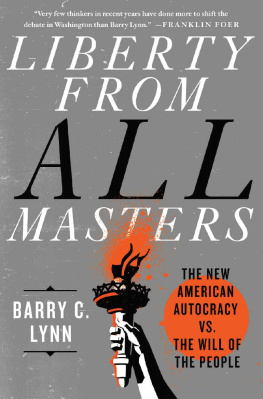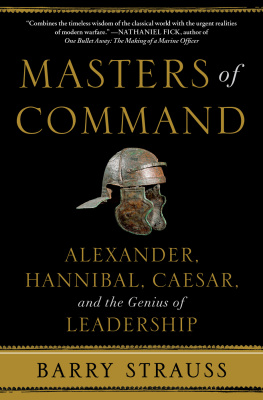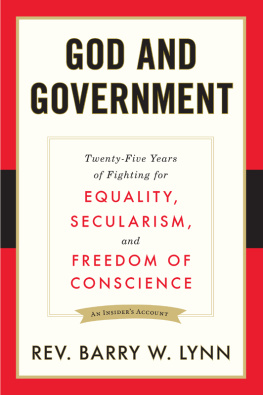Barry C. Lynn - Liberty from All Masters
Here you can read online Barry C. Lynn - Liberty from All Masters full text of the book (entire story) in english for free. Download pdf and epub, get meaning, cover and reviews about this ebook. year: 2020, publisher: St. Martins Publishing Group, genre: Politics. Description of the work, (preface) as well as reviews are available. Best literature library LitArk.com created for fans of good reading and offers a wide selection of genres:
Romance novel
Science fiction
Adventure
Detective
Science
History
Home and family
Prose
Art
Politics
Computer
Non-fiction
Religion
Business
Children
Humor
Choose a favorite category and find really read worthwhile books. Enjoy immersion in the world of imagination, feel the emotions of the characters or learn something new for yourself, make an fascinating discovery.
- Book:Liberty from All Masters
- Author:
- Publisher:St. Martins Publishing Group
- Genre:
- Year:2020
- Rating:4 / 5
- Favourites:Add to favourites
- Your mark:
- 80
- 1
- 2
- 3
- 4
- 5
Liberty from All Masters: summary, description and annotation
We offer to read an annotation, description, summary or preface (depends on what the author of the book "Liberty from All Masters" wrote himself). If you haven't found the necessary information about the book — write in the comments, we will try to find it.
Liberty from All Masters — read online for free the complete book (whole text) full work
Below is the text of the book, divided by pages. System saving the place of the last page read, allows you to conveniently read the book "Liberty from All Masters" online for free, without having to search again every time where you left off. Put a bookmark, and you can go to the page where you finished reading at any time.
Font size:
Interval:
Bookmark:

Thank you for buying this
St. Martins Press ebook.
To receive special offers, bonus content,
and info on new releases and other great reads,
sign up for our newsletters.


Or visit us online at
us.macmillan.com/newslettersignup
For email updates on the author, click here.
The author and publisher have provided this e-book to you for your personal use only. You may not make this e-book publicly available in any way. Copyright infringement is against the law. If you believe the copy of this e-book you are reading infringes on the authors copyright, please notify the publisher at: us.macmillanusa.com/piracy.
Your people will rebuild the ancient ruins
and will raise up the age-old foundations.
I SAIAH 58:67, 1112
On the evening of March 11, 2020, I found myself in midtown Manhattan at Joe Allen, which has a good bar for a late dinner alone. Earlier that day Id taken the train from Washington to New York for meetings. I had planned to eat downtown with a friend, but she had a cough and did not want to leave her apartment. I settled onto a stool and ordered a bourbon and a small steak.
As the bartender set down my plate, the world suddenly seemed to tilt. The television near the front door was muted, but President Trump was on the screen and the news ticker told us he planned to stop all travel from Europe. I looked at the bartender as he stared at the TV, his half smile of disbelief slowly tensing. At the other end of the bar, three waiters stood, mouths agape. It wasnt hard to imagine their thoughts; about their jobs, their homes, their way of life. For a few moments the bar burst into nervous chatter. Then another flash of news: the NBA planned to suspend all games. Folks began to close out their tabs and hurry into the night.
Many years ago I worked as a warehouse carpenter and truck driver in the Garment District. Ever since, Midtown has felt like a second home. Many New Yorkers despise the area. But I love the energy of so many people, from all around the world, just trying to make a buck or have some fun. The piles of schlock, the hawkers and posers, the sea of faces glowing blankly in the pulsing light beneath looming dark towers of stone. Life, on the avenue.
But on this night, as I walked out of the bar and under the marquees, the wolfish or buzzed looks of the performers and partiers had been replaced by nervousness and fear. At the hour when bars normally fill, people instead rushed to trains or into cabs or to hotels, their eyes flaring if anyone came too close, the dull sheen of chemicals or simple happy human ignorance gone.
The next morning, New Yorks theater owners announced that, for the foreseeable future, Broadway was closed. In the weeks that followed, more than 15,000 New Yorkers would die of Covid-19, and more than 30 million Americans would lose their jobs. Nations fought over facemasks, states fought over ventilators, people fought for rolls of toilet paper.
I didnt expect to be walking on Broadway when the lights went out, but I have thought a lot about how societies break down. From 20 years of close study of human systems I have long believed that it was only a matter of time till some event triggered a cascading collapse of our most important assembly lines, including those for medical facemasks and essential drugs. Thats why I also knew that we could have easily avoided much of the chaos and confusion and pain and death of the first months of the pandemic.
Covid-19 is a hard disease. It spreads fast and can kill swiftly. But the effects of Covid-19 were made far worse by stupid decisions that allowed monopolists to ruin and wreck many of our most vital industrial systems, in ways that endanger us as individuals and as a nation.
I know this issue well. I have written two books about the economic and political threats posed by the ways monopolists have reorganized American and international industry over the last generation. Just this spring, the Open Markets Institute that I head launched a partnership with the Organisation for Economic Co-operation and Development, in Paris, to study these dangers and recommend fixes.
In Liberty from All Masters I dont address these dangers in depth, though I do touch on them. Instead I focus on something even more fundamentalthe tools that will help us build not merely a far safer world in the days to come, but also a more fair and just world.
The idea that there are basic flaws in how we have engineered our assembly lines may seem shocking. After all, Americans mastered mass manufacturing more than a century ago, and have benefited enormously from the prosperity it made possible.
But the basic problem is not hard to understand.
Monopolists, to gain money and power, routinely concentrate control over some vital activity, such as the production of a semiconductor, or chemical, or component in N95 facemasks. In the process, they also often concentrate the capacity to make these goods. This means that rather than manufacture an important product in, say, five factories around the world, they centralize production in a single factory. The most obvious result of such monopolization is that we end up with fewer of the things we needsuch as facemasks and syringesand what we do get costs more.
A second result, in some respects more dangerous than the first, is that when a shock such as an earthquake or a pandemic cuts off access to one of these keystone factories, it can trigger a cascading crash of entire systems of production.
Every one of us knows not to put all our eggs in one basket. Yet when it comes to many of the products and foods and drugs that keep us alive, monopolists have put most or even all the machines that produce these goods in a single city, often in a single factory, often on the other side of the world.
I first learned of this flaw in September 1999, after an earthquake in Taiwan resulted in an almost immediate shutdown of computer factories in the United States. At the time I was running a magazine called Global Business, and I had spent years studying how corporations were reengineering their assembly lines to take advantage of the radical new rules of trade put into place after the collapse of the Soviet Union.
Even so, the fact that our government had allowed two foreign corporations to concentrate most of the worlds capacity to build an essential semiconductor in one city in Taiwan surprised me. So I set out to learn how this happened and what it meant.
I first wrote about the problem in Harpers in June 2002, in an article titled Unmade in America: The True Cost of a Global Supply Chain. I provided more detail in my first book, End of the Line: The Rise and Coming Fall of the Global Corporation, in 2005. In that book I also explained how such concentration can create dangerous political dependencies, especially on China.
I returned to the subject in my second book, Cornered: The New Monopoly Capitalism and the Economics of Destruction, in early 2010. My main goal in Cornered was to explain how monopolization threatens our democracy. But I also devoted large sections to showing how the one-two punch of monopolization and shareholder governance of corporations results almost inevitably in the destruction of the machines and skills we rely on to feed and clothe ourselves and keep ourselves healthy and safe.
Ever since, I have walked these warnings around Washington, Silicon Valley, Wall Street, and world capitals. I have met with top officials in the Treasury and Commerce departments, in the Pentagon and the CIA, in manufacturing and banking and insurance corporations.
Font size:
Interval:
Bookmark:
Similar books «Liberty from All Masters»
Look at similar books to Liberty from All Masters. We have selected literature similar in name and meaning in the hope of providing readers with more options to find new, interesting, not yet read works.
Discussion, reviews of the book Liberty from All Masters and just readers' own opinions. Leave your comments, write what you think about the work, its meaning or the main characters. Specify what exactly you liked and what you didn't like, and why you think so.








